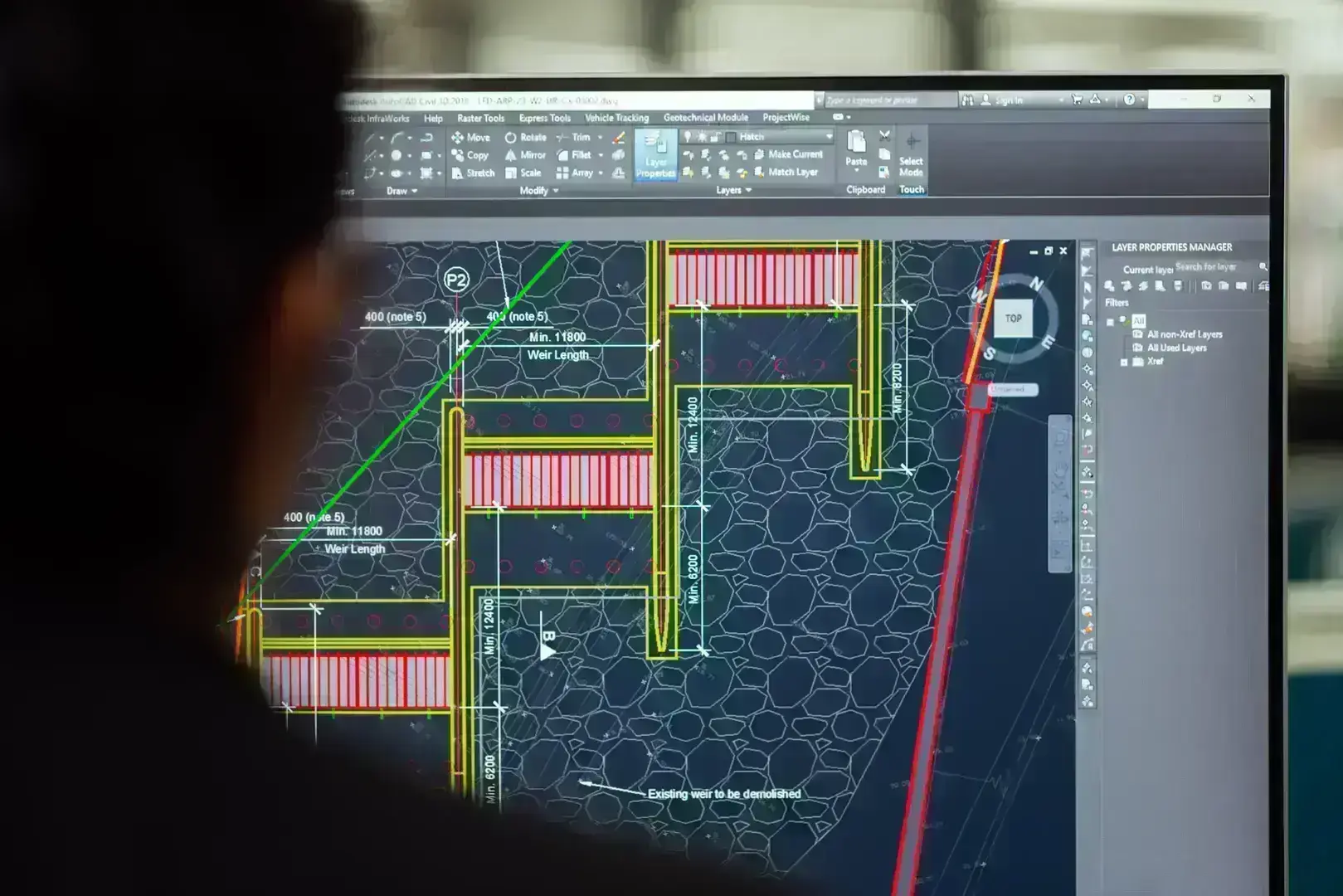Bespoke Software
-
Bespoke Software

5 ways digitalization enhances the student experience
Digital transformation in education enhances accessibility, communication, innovation, capacity building, and decision-making, preparing students for a technologically advanced future.
-
Bespoke Software

6 reasons why software development projects fail
Software projects often fail due to unclear requirements, unrealistic expectations, poor communication, no end-user involvement, lack of flexibility, and poor testing practices.
-
Bespoke Software

7 reasons why software development projects succeed
Ensure software success with clear requirements, user involvement, flexibility, transparency, strong communication, and thorough testing.
-
Bespoke Software

8 advantages of bespoke software (part 2)
Bespoke software tailors to specific needs, enhancing control, maintenance, scalability, and automation, offering unique advantages over generic off-the-shelf solutions, vital for business growth and efficiency.
-
Bespoke Software

8 benefits of using recruitment software
Recruitment software streamlines hiring processes, enhancing efficiency and candidate reach, essential for businesses in a dynamic job market.
-
Bespoke Software

A construction software checklist will help you to make the right decision
Choosing the right construction software is crucial for project efficiency, aligning tasks, and overcoming industry challenges post-lockdown.
-
Bespoke Software

A guide to requirement gathering
Effective requirements gathering is crucial for project success, involving thorough analysis and collaboration to understand client needs and expectations.
-
Bespoke Software
Agile vs Waterfall: Which Project Management Methodology Is Right For You?
-
Bespoke Software

Automated vs. manual testing
Repetitive life and software testing parallel, Manual and automated testing in software reflect life's monotony, each with unique pros and cons, highlighting efficiency versus thoroughness.
-
Bespoke Software

Best practice for how the UK’s tertiary education sector should approach digital transformation
Pandemic-induced digital transformation in UK tertiary education streamlines operations, but true change requires integrated IT systems, enhancing security, productivity, and decision-making.
-
Bespoke Software

Breaking down technology’s subservience to culture
The 'chicken or egg dilemma' in technology versus culture highlights their intertwined influence- technology shapes society's behaviors and needs, while cultural and social factors drive technological adoption and innovation.
-
Bespoke Software

Business software uses in small and medium enterprises
Business software enhances productivity, reduces costs, and measures performance, offering various solutions including SaaS, cloud computing, payroll/accounting, and HR management, crucial for data handling and decision-making.
-
Bespoke Software

Eliminate the inefficient, implement the best
Only 5.5% of construction professionals fully integrate their software, hindering productivity. Embracing bespoke, user-friendly digital solutions can significantly enhance efficiency and collaboration.
-
Bespoke Software

Ensuring better quality through Agile testing practices
Agile testing integrates continuous testing into development, fostering teamwork, improving communication, and allowing rapid bug fixes, enhancing software quality and efficiency.
-
Bespoke Software

Enterprise software solutions company - HeadChannel UK
Enterprise software solutions enhance business success by automating processes, improving efficiency, and fostering better communication
-
Bespoke Software

Experience 2030: the future of customer experience is… Now!
Post coronavirus, customer service priority surges for digital services essential for personalized, responsive experiences influencing consumer loyalty and spending.
-
Bespoke Software

Fighting for the UK manufacturing. Meeting the challenges of the future
An in-depth analysis of the challenges and opportunities facing the UK manufacturing sector, including the impacts of Brexit, COVID-19, and the adoption of Industry 4.0 technologies.
-
Bespoke Software

Green design sustainability: avoiding future wastage
Green design sustainability counters harmful trends through circular economy, eco-design, and innovative practices like modularity and disassembly for environmental protection.
-
Bespoke Software

Has your business met cloud computing yet?
Cloud computing, offering SaaS, PaaS, and IaaS, revolutionizes data access and storage, enhancing flexibility and security for businesses and individuals.
-
Bespoke Software

Healthcare software systems - the 7 types - HeadChannel UK
Healthcare software systems offer vast benefits like streamlined management, accurate records, scheduling ease, enhancing patient care and operational efficiency.
-
Bespoke Software

How does it feel to be a BBC successful tenderer?
HeadChannel becomes BBC's authorized supplier, highlighting their expertise in bespoke software development and commitment to delivering innovative, quality solutions.
-
Business Intelligence Bespoke Software System Integration

How Large Action Models Can Transform Your Data into Action (And What to Watch Out For)
Wish your spreadsheets could do more? Large Action Models (LAMs) automate intelligent decisions, transforming processes. Discover their potential, challenges, and how to get started.
-
Bespoke Software

How small and medium businesses fared during the pandemic
The pandemic drove SMBs to prioritise health, safety, and digital adoption. Salesforce reports resilience through tech, with digital engagement and communication key to future success.
-
Bespoke Software

How to know if you need a bespoke software solution
Custom software, tailored to business needs, provides scalability and efficiency, outperforming generic off-the-shelf solutions in growth and adaptability.
-
Bespoke Software

How to rescue a failing software project
Rescuing a failing software project involves analyzing issues, evaluating dependencies, supporting source code, and ensuring ongoing maintenance, while addressing common pitfalls like disappearing partners, conflicting opinions, and low-quality software.
-
Bespoke Software

Identifying and Prioritising Features During the Discovery Phase
The discovery phase is crucial for clear goals, user understanding, and efficient resource use, preventing miscommunication and scope creep.
-
Bespoke Software

Increase workplace safety in post-pandemic times with AI
AI technology ensures mask compliance on construction sites by automating detection, offering real-time monitoring, enhancing safety, and boosting business prospects through adherence to health regulations.
-
Bespoke Software

Is healthcare chatbot the future of the medical industry driven by AI?
During the COVID-19 pandemic, AI healthcare chatbots significantly eased healthcare workloads, offering flexibility, efficiency, and reliable information, with potential for broader future integration in healthcare systems.
-
Bespoke Software

Is the cost of software equal to its initial price?
In digital transformation, businesses must choose between bespoke or off-the-shelf software, considering long-term costs and tailored efficiency needs.
-
Bespoke Software

Keep calm and get your cloud under control
Effective cloud control hinges on understanding provider capabilities and honing in-house expertise, emphasizing security, data management, and tailored cloud solutions to prevent data loss and ensure compliance.
-
Bespoke Software

Main Roles and Responsibilities in the Software Development Cycle
Successful software development relies on cross-functional teams comprising diverse roles from Product Owner to DevOps Engineer, working in harmony to deliver exceptional solutions.
-
Bespoke Software Web Development

Multi-Tenancy Support in Angular Apps with ABP.IO
In the digital era, multi-tenant architecture ensures scalable and cost-effective web apps. Learn how to implement it in Angular using ABP.IO with subdomain-based tenant identification: https://{tenant}.mydomain.com/.
-
Bespoke Software

How does nanotechnology in medicine stand today?
Nanomedicine uses nanoparticles for precise drug delivery, early detection, and personalised treatment of diseases like cancer, HIV, and diabetes, minimising harm to healthy cells.
-
Bespoke Software

New Product Introduction process (NPI)
In today's competitive market, businesses must excel in New Product Introduction (NPI) to succeed. NPI encompasses idea conception, development, and rigorous testing before launch, adapting to customer needs and market demands.
-
Bespoke Software

Our Agile interview with Vivifyscrum
Kate Witko, PMO Manager at HeadChannel, discusses transitioning to Agile for a brokerage and manufacturing system project, facing challenges in team self-organization and client education.
-
Bespoke Software

Our Difference, our principles...
We detail our unique approach as a technical partnership company, emphasizing our 'One Team' concept for seamless integration with clients.
-
Bespoke Software

Poland’s best: HeadChannel wins Clutch award for best Polish software developer 2021
HeadChannel, a top Polish bespoke software developer per Clutch, delivers efficient, tailored solutions.
-
Bespoke Software

Post pandemic software solutions for the construction industry
Touchless check-in systems for construction sites ensure health and safety compliance, offering secure, QR-code-based entry with health screening, benefiting in time management and cost savings.
-
bespoke-software Bespoke Software

Software for resale – what you need to know
Switching from custom software to resale product software requires a new approach emphasizing flexibility, durability, and standardization, leading to higher initial development costs but offering benefits like recurring revenue and reduced business risk.
-
bespoke-software Bespoke Software

Software migration
Switching from custom software to resale product software requires a new approach emphasizing flexibility, durability, and standardization, leading to higher initial development costs but offering benefits like recurring revenue and reduced business risk.
-
Bespoke Software

System administrator job description
System administrators are vital in today's digital business world, ensuring smooth IT operations. Their role adapts with technological trends, focusing on security and efficiency. Qualifications vary, but technical skills and problem-solving are key.
-
Bespoke Software

Team extension, managed services and fixed price projects. For whom, how much, when and why?
In outsourcing managed teams, cost and conditions vary by contract type- team extension, managed services, and fixed price, each with specific responsibilities, costs, and project suitability.
-
Bespoke Software

Technical leader role specification in a scrum team
Scrum, a popular agile methodology for improving work processes, emphasizes self-organizing, cross-functional teams without external control, enhancing productivity and team dynamics.
-
Bespoke Software

Testing Low-Code Applications
Low-code platforms simplify app development but require thorough testing—functional, regression, and security—to ensure reliability, performance, and quality.
-
Bespoke Software

The benefits of using property management software
Property management software streamlines real estate business processes, increasing efficiency and productivity by simplifying tenant management, automating routine tasks, and enhancing online presence, ultimately leading to business growth and improved customer satisfaction.
-
Bespoke Software

The Difference between Support and Maintenance
HeadChannel's comprehensive support and maintenance services ensure the long-term success of your bespoke software, focusing on reliability, security, and alignment with your evolving business needs.
-
Bespoke Software

The digital transformation of the pharmaceutical industry
The pandemic accelerated the digital transformation of the pharmaceutical industry, advancing technologies like AI, blockchain, 3D bio-printing, AR, and IoT, enhancing drug development, supply chain management, patient engagement, and ethical testing methods.
-
Bespoke Software

The digital transformation of the UK construction industry
UK construction faces challenges and opportunities in digital transformation, focusing on 5G, AR/VR, and connected construction for future resilience.
-
Bespoke Software

The implications for the future of the infrastructure and urban development (IU) industry: scenario 1
Technological advances in IU are creating a virtual world focused on residential and recreational spaces, necessitating digital transformation.
-
Bespoke Software

The implications for the future of the infrastructure and urban development (IU) industry: scenario 2
Future global crisis leads to private sector dominance in infrastructure, with a focus on efficient, modular construction and technology.
-
Bespoke Software

The implications for the future of the infrastructure and urban development (IU) industry: scenario 3
Global focus on sustainability transforms IU industry; emphasis on recycling, innovative materials, and tech for eco-friendly construction and maintenance.
-
Bespoke Software

The Importance of Business Analysis in the Discovery Phase of Web Development
The discovery phase sets objectives, prioritises features, and optimises resources, ensuring efficiency, reducing scope creep, and aligning projects with goals for success.
-
Bespoke Software

The IU and construction industry transformation imperatives in the near future
To adapt to challenges like urbanization and climate change, IU sector needs innovative tools, talent, and digitalization for future readiness.
-
Bespoke Software

The Most Common Software Bugs
From catastrophic crashes to subtle calculation errors, software bugs can have far-reaching consequences. Learn how to identify and address these common issues before they impact your business.
-
Bespoke Software

The spiral model of software development
The Spiral Model, blending waterfall and iterative methods, excels in managing risks and accommodating changes, ideal for large, complex projects.
-
Bespoke Software

Things to pay close attention to during business analysis
Thorough business analysis is vital for custom software success, focusing on problem identification, stakeholder input, and clear requirement documentation.
-
Bespoke Software

Time and material vs. fixed price
Bespoke software offers control and customization, with options like fixed-price or time & material contracts to suit varied needs and budgets.
-
Bespoke Software

Top 5 features of an event management software
Event management software is essential, featuring budget, on-site functionality, staff recruitment, attendee management, and campaign tools for effective event planning.
-
Bespoke Software

Top benefits of using JIRA reporting and transparent processes of project management
Enhanced project visibility and transparency through JIRA software ensures client trust, effective management, and seamless communication in project development.
-
Bespoke Software

Understanding telehealth and telemedicine
Telehealth encompasses both clinical and non-clinical remote healthcare, while telemedicine focuses specifically on remote clinical services via technology.
-
Bespoke Software

What is a CRM and its benefits
CRM software automates sales processes and customer interactions, enhancing lead management, communication, and forecasting, boosting sales and customer service efficiency.
-
Bespoke Software

What is Agile project management? Key values and principles
Agile is a flexible, iterative project management approach emphasizing collaboration, customer involvement, and adaptability, contrasting traditional Waterfall methods.
-
Bespoke Software

What is AI in healthcare?
AI enhances healthcare through data analysis, improving diagnostics, drug discovery, personalized medicine, reducing unnecessary procedures, and increasing access to specialized care.
-
Bespoke Software

What is an agile kanban methodology?
Kanban, rooted in Agile, streamlines work by aligning team workloads and customer needs, emphasising continuous progress over Scrum’s shorter cycles.
-
Bespoke Software

What is ‘DLL injection’?
DLL Injection involves inserting code into another process's memory via DLLs, enabling tasks like reverse engineering and hot-patching.
-
Bespoke Software

What is ecommerce software and its benefits
Ecommerce software streamlines online sales, integrating front and back-office systems for product, inventory, and order management, enhancing customer experience and business efficiency.
-
Bespoke Software

What is IoT in healthcare?
IoT in healthcare improves patient care, monitoring, and resource management through smart devices and telemedicine, despite challenges in data security and tech access.
-
Bespoke Software

What is perfume AI, and how technology can create fragrance a human will love?
Perfumes evolved from ancient rituals to daily essentials by the 1950s. Today, AI enhances fragrance creation, blending technology with traditional artistry.
-
Bespoke Software

What is rapid applications development (RAD) and how to use it?
Rapid Application Development (RAD) uses iterative prototyping and quick feedback to build custom apps efficiently, ensuring adaptability and customer satisfaction.
-
Bespoke Software

What is the Extreme Programming?
Extreme Programming (XP) is an agile method focusing on teamwork, short releases, and customer interaction to adapt to changes and boost satisfaction.
-
Bespoke Software

What makes a good test engineer?
Successful software testing requires curiosity, analytical skills, effective communication, skepticism, and good time management—key traits for an exceptional test engineer.
-
Bespoke Software

Which companies can benefit from inspection software
Inspection software automates repetitive tasks, enhancing accuracy and efficiency in various industries, crucial for property, car rentals, and construction management.
-
Bespoke Software

Which companies can benefit from property management software
Bespoke property management software boosts hospitality industry productivity, simplifies operations, enhances customer experience, and helps businesses stay competitive.
-
Bespoke Software

Which companies can benefit from recruitment software
Recruitment software streamlines hiring processes, enhancing efficiency and candidate experiences for recruiters, event managers, and HR departments, fostering competitive advantage.
-
Bespoke Software

Why do we need software testing?
Software testing is essential in business, ensuring products meet expectations and function across devices, ultimately safeguarding reputation and financial investments.
-
Bespoke Software

Why do you need software prototyping?
Prototyping in software development helps visualize solutions, ensures customer involvement, clarifies functionalities, and streamlines the development process, saving time and costs.
-
Bespoke Software

Why good business analysis is essential
Business analysis is crucial in all companies for successful software projects, ensuring clarity, reducing rework, and enhancing communication for project success.
-
Bespoke Software

Why is it important to engage end-users in software development?
Engaging end-users in software development ensures the creation of user-friendly, effective solutions, avoiding costly redevelopments and meeting real user needs.
-
Bespoke Software

Why you need Agile software development tools
Agile methodology in software development emphasizes adaptability and customer satisfaction, requiring tools for effective communication, identification, reporting, and analytics.
-
Bespoke Software

Why you should consider software maintenance
Software maintenance is crucial for businesses to ensure continuous operation, bug fixes, flexibility, updates, improved user experience, and data security.